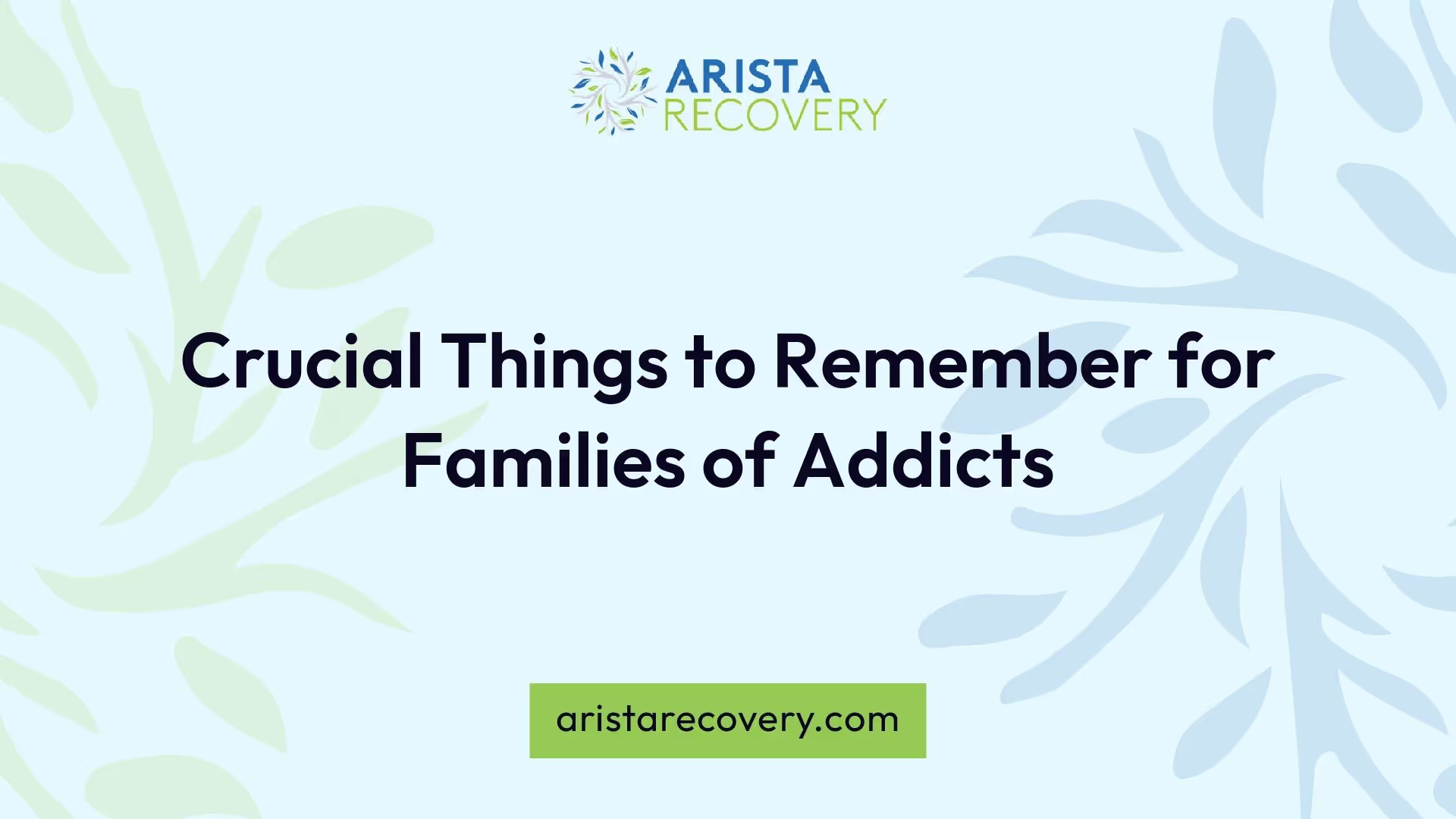
Crucial Things to Remember for Families of Addicts
Supporting an Addicted Loved One
Supporting a loved one who's caught in the throes of addiction ain't easy, but it's a big deal for helping them get back on their feet. Setting up clear boundaries and nudging them to get some help are key steps you can take to help them along.

Setting Boundaries that Matter
Setting boundaries is a biggie when you're dealing with someone battling addiction. They help the person see how much their addiction is taking a toll and motivate them to get help. Without any boundaries, it’s easy to just let the destructive behavior slide without facing any real consequences (Family First Intervention).
Boundaries aren't about laying down the law; they're about protecting yourself and setting up some guidelines that encourage better habits. Here’s a bit of a blueprint for setting up boundaries if you're dealing with someone who's struggling:
- No substances at home: Lay down the rule that drug or booze-fueled gatherings aren't allowed at your place.
- Zero tolerance for insults: Make sure your space is a safe space, where insults are a no-no.
- No covering up: Don't hide or make excuses for their questionable antics, especially when it involves other people.
- Get family routines going: Keep things steady at home with regular family stuff that’s all about positive vibes.
These boundaries can help the person battling addiction see that maybe it’s time to make some changes, giving them a nudge from thinking about getting better to actually doing something about it (Family First Intervention, Healthy USD).
Encouraging Them to Get Help
Cheering on your loved one to get professional support is a big step in helping them kick their habits. Without a bit of a push, sometimes the same old patterns just keep playing out. It's about approaching with an open heart and mind. Here’s how you can make it a softer landing:
- Listen up: Ditch the judge robe and have real talks. Let them spill their guts without worrying they’ll get an earful.
- Be that info guy/gal: Share the perks of professional support, and maybe chat about treatment paths they might not know about.
- Point them toward support groups: Sometimes, seeing others battling the same demons can be the eye-opener they need.
These small acts can nudge them from feeling they’re on a lonely island all the way to opening up to getting help. Scouting out resources like community-based help or other support can make all the difference.
Helping a family member through their struggle with addiction is no walk in the park. But by setting boundaries and creating a supportive environment, you can be a critical part of their recovery ride.
Understanding Addiction in the Family
When addiction creeps into family life, it can throw a wrench in the works, especially for kids. Parents are supposed to be superheroes, right? But what happens when your hero can't find their cape?
Impact on Children
For a kid, having a parent who struggles with addiction is like living in a whirlwind. Everything gets stirred up—school, friends, even home life becomes unpredictable [1]. It can feel like walking a tightrope, always trying to keep your balance and not knowing when—or if—you'll fall.
Parents and those who care for kids need to get these challenges. If they understand them, they can lend a hand, offer guidance, and maybe even smooth out some of the bumps. It's not a bad idea to have a pro on your side to help tackle these emotional hurdles.
Setting Boundaries with Addicted Parents
Creating boundaries with parents who have substance issues is like putting up a safety net. It gives kids room to breathe and think straight, making life feel more sane [1]. It's their way of saying, "I need some ground rules here, folks!"
Here are four ways kids can create some personal space and ensure there's a safety line:
- Ban it at Home: No drinking or doping allowed at homestead.
- Friendly Chat Rules: Talk without putting each other down.
- No Hiding Games: Don't make excuses or cover for a parent's habits.
- Family Rituals: Keep simple routines that include everyone.
These tips help kids shield themselves emotionally while giving parents a gentle nudge toward healing or getting help [1]. Need more ideas? Chat with a pro who gets it can really lift some weight off your shoulders. Knowing how to put these into practice is key, and just one of those things to keep in mind for all the folks parenting through this.
Signs of Substance Use in Teens
Spotting the signs a teen might be using drugs or alcohol can help stop small issues from getting out of hand. The sooner adults can step in, the better it will be for the teenager.
Early Warnings
Noticing the first signs of substance use lets parents act before things get worse. Some common red flags could look like this:
If you notice any of these things, it might mean they're misusing drugs or alcohol. So if you spot these signs, it might be time to explore options like a teen drug intervention program [2].
Tips for Prevention
Keeping teens away from substances before they start is all about being proactive. Here's how parents can help prevent substance misuse:
- Talk Openly: Having open chats about the dangers of drugs can cut the chances of misuse by half [2].
- Lead by Example: Your behavior around alcohol and drugs sets the tone. Show them what responsible behavior looks like.
- Get Involved in the Community: Encourage joining community programs aimed at stopping teen prescription drug abuse [3].
- Teach the Risks: Make sure your teen knows the dangers of drug use. Adapt the conversation as they grow up.
- Keep an Eye on Their World: Know what they're up to and who they're with since their surroundings can influence addiction risks.
Using these tips can seriously help in steering teens away from substance misuse. For more ways to chat about this tough subject, check out how to talk to kids about drugs without talking about your own drug use.
Family Support and Resources
If you're dealing with addiction in your family, getting the right support can make a world of difference. Helplines and professional help should be your go-to lifelines when navigating the rough waters of addiction.
SAMHSA Helpline
Meet your new best friend: SAMHSA, aka the Substance Abuse and Mental Health Services Administration. This group’s hotline is a real lifesaver for individuals and families looking for help. Just in 2020, they got over 833,598 calls, which is a big jump (like 27 percent) from 2019 [4]. They're your starting point when you're looking to tackle mental health and substance abuse issues.
You can contact SAMHSA by grabbing your phone and dialing 1-800-662-HELP (4357) or texting your area code to 435748 (HELP4U). And if you're an online multitasker, hop over to FindTreatment.gov for more info on recovery and prevention.
Seeking Professional Help
Professional support is like having a flashlight in a dark cave when you're dealing with addiction. Therapy and counseling can give families the tools and strategies they need to manage their unique situations. It creates an atmosphere where everyone—both the one struggling and their loved ones—feels supported.
Mental health pros help demystify addiction's grip and give you solid strategies to handle it better. Families could benefit from different services like individual counseling, group sessions, or special programs designed for struggles with addiction. Checking out community-based prevention programs can also reduce the risk of more substance trouble.
Recovery’s a tough road, but resources like SAMHSA and professional help can empower families to look out for each other while keeping themselves grounded. For extra tips and tricks, you might want to delve into resources on five herbs to aid in the recovery process that could be a game-changer.
Talking to Children About Addiction
Chatting about addiction with kids can be tricky. Getting it right is super important. Kids can have all sorts of feelings about a parent's substance use, and it’s crucial to help them sort through the mess of emotions.
Addressing Emotions
Kids with addicted parents often feel mixed up, angry, scared, and even guilty, thinking maybe they did something wrong. The Cenikor Foundation points out that these feelings might push them to lash out or even bottle things up if no one's talking to them about what's going on.
Don’t put off these chats. Not talking can leave kids wondering if their family isn’t like everyone else's or if things will ever get better. Tackling addiction head-on, but gently, helps clear up these worries, showing them it’s not their fault. It also opens the door to share and work through their feelings.
Tailoring the Conversation
Changing up the conversation depending on how old the kid is really matters. Little ones need simple talk, while teenagers might want more details. The Cenikor Foundation advises keeping it clear and something they can get, no big words.
When chatting, make sure kids know they won’t be alone facing stuff. Stress that addiction can be tackled and fixed, and that there are folks ready to help parents make their way out.
Wrapping things up on a good note is important. Kids need to walk away feeling there's hope and a future to look forward to, even if it's tough going at times. For parents wanting more help with the nitty-gritty of these talks, there's extra reading like how to talk kids about drugs without talking about own drug use and community-based prevention programs reduce teen prescription abuse.
References
[1]: https://healthyusd.com/how-to-set-boundaries-with-addicted-parents/
[2]: https://www.hazeldenbettyford.org/articles/warning-signs-teen-substance-use
[3]: /community-based-prevention-programs-reduce-teen-prescription-abuse
When mental health challenges and addiction intersect, it can feel isolating. At Arista, we offer compassionate, evidence-based, and trauma-informed care to help you heal, grow, and move forward.
You’re not alone in this.
When mental health challenges and addiction intersect, it can feel isolating. At Arista, we offer compassionate, evidence-based, and trauma-informed care to help you heal, grow, and move forward.
Support that moves with you.
You’ve taken a brave first step. At Arista Recovery, we’re here to help you continue with best-in-class care designed for long-term healing and support.
.webp)






